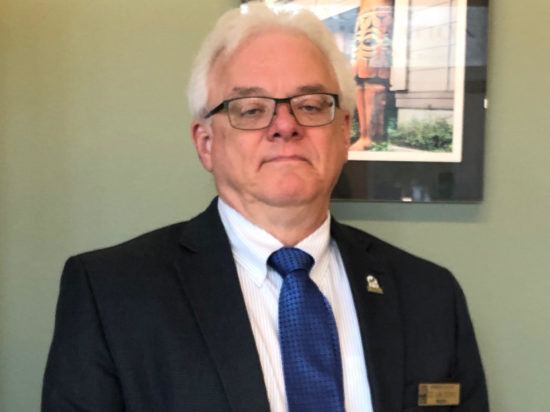
Story and photo by Saki Kambe
The first ever food pantry at Peninsula College—discussed for years—will happen as soon as all the logistics are worked out, according to Peninsula College Officials. President Luke Robins is hoping to have the food pantry open in the spring quarter. The survey to determine the logistics and to ensure that the food pantry meets students’ needs, such as operating hours, will come out soon, if not by the end of the quarter. Kari Collen, the Associate Dean for Enrollment Services of Student from the Student Service Department, said this food pantry targets every current student, and it will be overseen by Student Services, along with Associates Student Council having a significant role in the management. It is most likely to happen in the Pirates Union Building, and it is going to be a dry food pantry only.
Tara Martin Lopez, the Professor of Sociology, said that she was familiar with poverty as a kid.
“I had to go to food pantries and clothing pantries because my family didn’t have enough. I have personal connections to it,” Lopez said.
Lopez explained the background of the food pantry.
“In the spring of 2018, the first speaker the Faculty Senate, I called the meeting of different people like staffs, faculty, to address this issue of bringing up the food pantry again. And eventually, the proposal was developed, then the president approved.”
The college conducted a hunger survey, and 56 percent of the students answered often or sometime in the last 12 months that their food didn’t last and they didn’t have money to buy any more.
“This form of insecurity is very common in the United States that forces them not to buy text books, miss class, or just drop classes. This is not distinctive to Peninsula College, but it’s part of broader issues,” Lopez said. Lopez wishes to remove ill will. “Students that are facing hunger shouldn’t feel a stigma, because it’s not their fault; and so they know that it’s not just them facing it. Anybody can go, so people don’t feel left out.”
President Robins weighed in. “From my perspective, that if we’re going to do it, how do we ensure that it’s sustainable. I don’t think the college is being supportive of students, to do it and then stop it and start it, and then stop it, so we wanted to make sure that is we’re going to do it, we want to sustain it over time because I think it’s very important.”
The college has its commitment to the food bank in town and is currently working so that the college can have some food from the food bank to have up here and have it keep stocked. The college is also talking with them about having a software product that allows the college to keep track and inventory food. That way the campus will get a sense of how it’s being used in the long term so that the college can look at the data of how effective it is, and demand and supply.
Robins stated that most of the two-

year colleges in Washington State having food pantries and the data that showed the students are suffering from food insecurity was the major factor of finally taking a huge step ahead.
Robins explained his role for this food pantry as a ”cheerleader.” He said he believes that food insecurity is one of the biggest challenges students face, and that plays a huge role in preventing students from academic success.
Having a food pantry at the college on the public transportation lines will allow students not to worry about another insecurity, the transportation insecurity, Robins said. “Feed hungry people where they’re at.” Robins shared this quote from one of his friends that inspired him, which he said he believes perfectly applies to the food pantry. Robins hopes that this food pantry is a part of broader support services that the college has for students.
“I think it’s an opportunity for people within our college community to take responsibility to take responsibility for caring about other people in the college community.”
